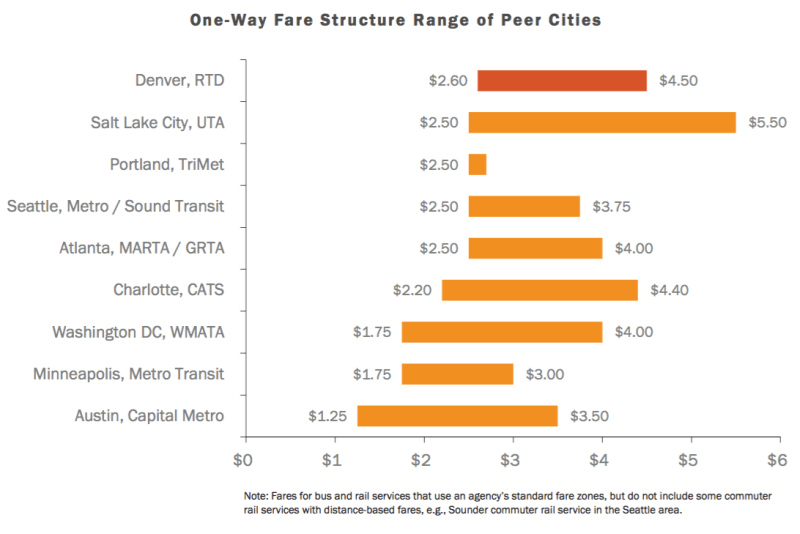Fixing Denver Transit: Fairer Fares

As part of our series on fixing Denver’s transit system, today Streetsblog is focusing on fares and how to make them more affordable.
“Compared to its peer cities, Denver has among the highest one-way fares,” according to a recent report from the team working on the Denveright transit plan. Overall, they concluded, RTD’s fares “are relatively high” compared to Seattle, Portland, D.C., Salt Lake City, Austin, Atlanta, Charlotte, and Minneapolis.
A one-way fare on a bus or train runs $2.60 for a local trip or $4.50 for a regional trip. None of the peer cities except Salt Lake have higher prices.
For many people, the bus and train are lifelines for getting to work, the grocery store, or anywhere else beyond walking distance of their home. Most of RTD’s riders come from households making less than $50,000 a year, according to an RTD survey.

Denver also has three fare zones, a set-up that “can be cost-prohibitive for people with lower incomes” who have to travel across multiple zones, the Denveright report found.
For example, if you live in Green Valley Ranch and work five days a week downtown, the commute would traverse all zones, costing $9 daily, or $180 per month ($171 if you buy a monthly pass). Portland’s TriMet system, in contrast, has a single fare zone with a flat $2.50 fare.
High fares can combine with cheap driving costs to turn people away from transit. “With the low cost of parking and lack of roadway tolls, driving can be a more appealing travel choice than taking transit and paying a high fare cost,” the report states.
RTD’s state-mandated policy of providing cheap parking at stations is especially regressive. Less affluent transit riders who don’t drive to the train are, in effect, subsidizing more affluent car-owning transit riders, while agencies do little to improve the quality of walking access to transit, which would help low-income riders most of all.

While the Denveright team says the current fare structure has to change, they haven’t laid out detailed recommendations to fix it yet. “Local day passes at $5.20 (the cost of a local round trip) can reduce costs for riders making multiple trips in a single day,” the report states. “RTD’s Community Pass Programs can also provide cost savings for some neighborhoods and for college students, but other programmatic improvements could help improve access to transit and increase ridership.”
Specific proposals to improve the fare system will presumably be developed as the Denveright plan progresses.
If you missed the first two installments of Streetsblog’s Fixing Denver Transit series, catch up with our posts about the shoddiness of Denver’s bus stops and the lack of dedicated bus lanes on city streets.


